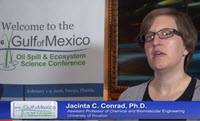The Role of Microbial Motility for Degradation of Dispersed Oil project is lead by P.I. Jacinta C. Conrad, University of Houston.
Microbial biodegradation processes are thought to have played a substantial role in the surprisingly swift disappearance of oil and gas released into the Gulf of Mexico after the catastrophic Deepwater Horizon MC252 blowout. Although previous GoMRI-supported work investigated the composition of the coastal, open-open, and deepwater microbial communities that degraded this oil, much remains poorly understood regarding the impact of physical factors in heterogeneous ocean and coastal environments on the rate of microbial biodegradation. Hence there is a pressing yet unmet need to understand how (a) nearby liquid oil/liquid water or gaseous oil/liquid water interfaces, (b) fluid flow, and (c) dispersants affect microbial motility towards dispersed oil. Moreover, this need must be addressed for bacteria living in each type of ecosystem impacted by catastrophic oil spills. The objective of this project is to elucidate the effects of oil-water interfaces on motility of marine bacteria in the initial stage in biodegradation, as microbes move towards and attach to dispersed oil.
Click for access to GoMRI’s YouTube videos of RFP-V Projects…
************
This project was funded by the Gulf of Mexico Research Initiative (GoMRI) in the RFP-V funding program.
The Gulf of Mexico Research Initiative (GoMRI) is a 10-year independent research program established to study the effect, and the potential associated impact, of hydrocarbon releases on the environment and public health, as well as to develop improved spill mitigation, oil detection, characterization and remediation technologies. An independent and academic 20-member Research Board makes the funding and research direction decisions to ensure the intellectual quality, effectiveness and academic independence of the GoMRI research. All research data, findings and publications will be made publicly available. The program was established through a $500 million financial commitment from BP. For more information, visit http://gulfresearchinitiative.org/.

